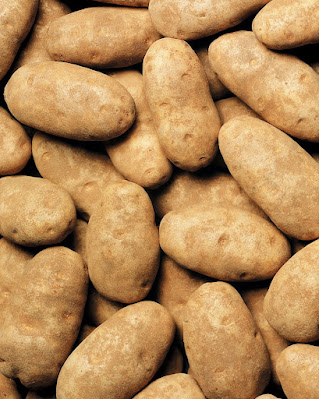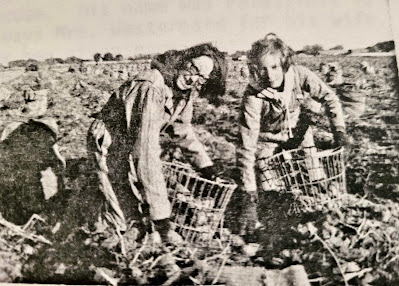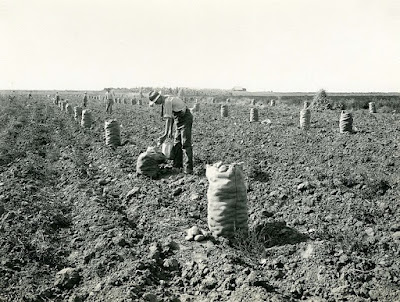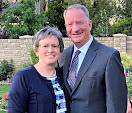Spud Harvest Has Become a Lost Art for Young People
September and October can be a great time in Eastern Idaho, except maybe for those who have allergies. Perhaps the most notable event was potato harvest (“spud harvest”). But "spud vacation" from school has since expired, fading into the dim light to the west. Unfortunately, technology has eliminated most kids from the spud fields. |
| Photo courtesy of Idaho Potato Commission |
Now huge combines ramble down rows, their monster blowers spewing dirt, vines, and weeds out the back. Few if any people stand anywhere near the combine, tossing vines, rocks, and clods to the ground below.
 |
| Photo courtesy of Idahopotato.com |
High-tech rollers shake so hard, yet delicately, that clod and vine-free spuds climb serendipitously up the conveyor like shoppers up an escalator and drop precisely in the back of trucks until they are full. Then the trucks race to the cellars, all climate-controlled, and unload their precious cargo on long pilers that stack the spuds in neat piles where they will stay for months until the price climbs high enough for a profit or low enough that they have to sell just to make the payments on the farm. (And potato prices are pretty high right now!)
It wasn't too many years ago, however, when many schools let out their students for a week or two so they could pick big russets. Nowadays, spud harvest has become a luxury for a few. Even Rigby School District, where I dutifully spent 12 years of my life learning and working in the potatoes, eliminated potato harvest from their school calendar. Surely a sign of progress or the lack of opportunity for youngsters to learn how to work and survive in the wilds of the potato fields.
The art of picking spuds consisted of two kids forming a partnership (We were emerging entrepreneurs back then and didn’t even know it!), each having his or her own row. Bending at the waist, knees bent just a bit, you placed the spud basket, encased with pink, black, or brown rubber, in front of you. Then with both hands, you scooped up spuds, shifting right and then left. After filling your baskets and dumping them gently into a gunny sack, you placed the sack in the middle of the two rows, setting out the tenth one for ease of counting.
 |
| My sister Telecia (R) and cousin Carol (L) picking potatoes |
I remember starting my spud-picking career when I was in the first grade. Of course, my net earnings for that year totaled a mere $4.14—a huge sum for a six-year-old. I used my windfall to buy Christmas gifts: big Wrigley's Spearmint and Juicy Fruit gum packs with 17 sticks for all eight members of my family. I think they cost me $1.00 for 4 packs.
I don't think making money during spud harvest was the biggest priority. For me, it was the lunches. Mom crammed a ton of food in the brown paper bags or one of Dad's old black lunch boxes. She usually included Hostess Ding Dongs or Twinkies or those huge white or pink Snowballs that tasted just a bit better when they were cold. We couldn't wait until lunch so we could race to the ditch bank where we had clandestinely hidden our lunches. We sat on the ditch bank, basking in the sun, eating, and washing it all down with a Shasta Tiki Punch or a thermos of hot chocolate.
 |
| Photo courtesy of Wikimedia Commons |
Usually, all of our friends worked in the same fields as we did. Often, we'd be bent over and thud, a victim of someone deftly throwing a potato or a clod and clobbering you on your back or head. Sometimes, our minds turned from picking to watching our backside to see if we could catch the culprit. More often than not, a clandestine spud or clod war ensued.
Of course, we had to be careful. The boss didn't take kindly to spud or clod throwers. More than once, I remember watching the digger crawl down the field and stop somewhere along the row. The farmer, covered with dust, slowly climbed down and sauntered over to the guilty. For a brief moment, the entire field went in slow motion, all of us trying to listen to what was being said. Farmers had an innate way of precisely expressing their own vernacular, so everyone understood. For a while, the war ceased, and we went back to picking spuds at pell-mell speed.
Backing down the cellar was a true lesson in driving precision. To me, it seemed, farmers made doorways just wide enough so a ten-wheeler with side mirrors could barely squeeze down. Pretty soon, I could gauge it correctly, and down I went. I unloaded and headed back to the field.
One spud harvest, we had a heater called a Salamander in the cellar. At about 10:00 a.m. or so, we placed a huge potato on the Salamander to bake and then turned it after every load. By the time lunch came, we had luscious baked potatoes to eat. None of this baloney sandwich business, just baked potatoes and several pats of butter. I don't think I have tasted a better baked potato.
Now, the only thing I can do is go out to my garden and pretend I'm picking spuds while digging mine with a shovel. Or even going to the supermarket and searching for Idaho potatoes in brownish bags. No more chugging down the field in a truck or being awakened from a nap by spuds pounding on the top of your cab, compliments of the combine driver. No more days out of school or bucker's specials. And, unfortunately, there isn't anyone around for a good ol' clod fight.
Sometimes, technology takes the fun out of life.
 |
| Photo courtesy of iStock photos |











No comments:
Post a Comment